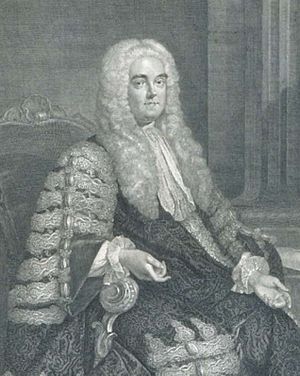John Verney (judge) facts for kids
Quick facts for kids
Sir
John Verney
|
|
|---|---|
 |
|
| Attorney General to the Queen Consort | |
| In office May 1729 – 20 November 1737 |
|
| Chief Justice of Cheshire | |
| In office 1732–1738 |
|
| Preceded by | John Willes |
| Succeeded by | Matthew Skinner |
| Master of the Rolls | |
| In office 9 October 1738 – 1741 |
|
| Preceded by | Sir Joseph Jekyll |
| Succeeded by | Sir John Strange |
| Personal details | |
| Born | 23 October 1699 Brasted, Kent |
| Died | 5 August 1741 |
| Nationality | British |
| Political party | Tories |
| Relations | George Verney, 12th Baron Willoughby de Broke |
| Children | John, 14th Baron Willoughby de Broke |
| Profession | Barrister, Judge, Politician |
Sir John Verney (born October 23, 1699, died August 5, 1741) was an important British lawyer, judge, and politician. He was a member of the House of Commons (like today's Parliament) from 1722 until 1741. He started his political career as a Tory but later supported the Whig government.
Contents
Early Life and Education
John Verney was born in Brasted, Kent, on October 23, 1699. He was the fifth son of George Verney, who was the 12th Baron Willoughby de Broke. His mother was Margaret Heath.
When he was 15, in 1714, he started studying at New College, Oxford University. In 1715, he joined the Middle Temple, which is one of the professional associations for barristers in London. He became a barrister (a type of lawyer who argues cases in court) in 1721. In 1724, he married Abigail Harley. Her uncle, Robert Harley, was a famous politician.
Political and Legal Career
John Verney wanted to gain more connections for his law work, so he decided to become a Member of Parliament (MP).
Becoming a Member of Parliament
In 1722, he was elected as a Tory MP for a place called Downton. His brother-in-law, Anthony Duncombe, helped him get elected.
At first, he spoke against the government, which was led by the Whig Prime Minister, Robert Walpole. For example, in 1724, he argued against keeping the army at its current size.
Switching Sides and New Roles
In 1726, John Verney changed his mind and started supporting the government. Soon after, he was given a job as a judge in Wales. He was re-elected as an MP and continued to support the government in Parliament. In 1727, he became a King's Counsel, which is a special title for experienced lawyers.
He was re-elected for Downton in 1727. In 1728, he became a Bencher at Lincoln's Inn, another important legal society.
Important Legal Positions
In May 1729, John Verney was appointed as the Attorney General to the Queen Consort, who was Queen Caroline at the time. This was a very important legal role.
He had to leave his Welsh judge job in 1732 because he wasn't well. However, he soon became the Chief Justice of Cheshire, another high-ranking judge position.
In 1734, he lost his seat in Parliament and was out of politics for a short time.
Master of the Rolls
After a judge named Sir Joseph Jekyll passed away in 1738, John Verney applied to take his place as the Master of the Rolls. This is a very senior judicial position in England and Wales. He was accepted and started this new role on October 9, 1738.
His health continued to be a problem, and he offered to resign from his Master of the Rolls job in early 1741. He was re-elected as an MP for Downton in 1741, but he passed away before Parliament met.
Death and Family
Sir John Verney died on August 5, 1741. He had one son and two daughters. His son, John, later became the 14th Baron Willoughby de Broke, taking over the title from his uncle (Sir John Verney's brother), who had no children.
 | Ernest Everett Just |
 | Mary Jackson |
 | Emmett Chappelle |
 | Marie Maynard Daly |

